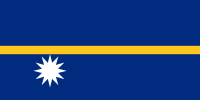- Nauruan nationality law
-
Nationality and citizenship in the Republic of Nauru are currently defined and regulated by the Constitution of Nauru and the Nauruan Community Ordinance 1956-1962. Dual citizenship is permitted.
Contents
Obtaining citizenship
Part VIII of the Constitution pertains to citizenship, and defined who was to become a citizen of Nauru upon the country's accession to independence in 1968. Article 71 refers to the Nauruan Community Ordinance 1956-1962. Any person who is
- "included in one of the classes of persons who constituted the Nauruan Community within the meaning of the Nauruan Community Ordinance 1956-1966 of Nauru is a Nauruan citizen."
Section 4 of the Ordinance in question establishes legal belonging to the "Nauruan community". Nauruans under this law include
- "aboriginal natives of the Island of Nauru by virtue of the institutions, customs and usages of the aboriginal natives of the Island of Nauru"
- non-Nauruan Pacific Islanders who are married to a Nauruan, and who thereby are deemed to become Nauruan
- non-Nauruan Pacific Islanders who have settled in Nauru, provided that they adhere to certain criteria, such as adopting a Nauruan way of life (cf. section 5.c.)
- any child born to two Nauruan parents within any of the definitions above, and any child born to a Nauruan who has married a Pacific Islander
The Constitution re-iterates the provisions of the Ordinance, and provides additional means of obtaining citizenship. These include:
- being born in Nauru and having no possibility of obtaining citizenship of any other country
- being a woman who marries a Nauruan citizen
- being granted citizenship by Parliament
The Constitution also establishes that the Parliament of Nauru may "make provision for depriving a person of his [sic] Nauruan citizenship", except if that person obtained citizenship through the provisions of the 1956 Ordinance, and except if that person was born of two Nauruan parents or of a Nauruan parent married to a Pacific Islander. Parliament is also authorised by the Constitution to "make provision for the renunciation by a person of his Nauruan citizenship".
Attempted ban on dual citizenship for MPs, 2008
On 22 March 2008, the Speaker of the Nauruan Parliament, David Adeang, called a Parliamentary session, allegedly without informing government ministers, who therefore did not attend. Opposition MPs, Adeang included, constituted a majority of legislators present, and passed a ruling outlawing dual citizenship for Members of Parliament.
The ruling, if applied, would affect senior Cabinet ministers Dr. Kieren Keke and Frederick Pitcher. Were they compelled to resign from Parliament, the Opposition would control a majority of seats in Parliament.
The government rejected the legitimacy of the ruling, stating that it was unconstitutional because of the lack of parliamentary quorum.[1] President Marcus Stephen accused Adeang and the Opposition of passing the ruling "after dark on Easter Saturday", "under candelight".[2]
In April, the Chief Justice of the Supreme Court ruled that the amendment to the citizenship law was unconstitutional, thus confirming that persons with dual nationality remain entitled to sit in Parliament.[3]
Notes
- ^ "Nauru government rejects citizenship ruling". Radio New Zealand International. 26 March 2008. http://www.rnzi.com/pages/news.php?op=read&id=38778. Retrieved 27 October 2011.
- ^ "Nauru President frustrated over parliament developments". Radio New Zealand International. 25 March 2008. http://www.rnzi.com/pages/news.php?op=read&id=38761. Retrieved 27 October 2011.
- ^ "Nauru judge blocks citizenship law change", ABC Radio Australia, 8 April 2008
References
Nationality laws (category) By continent AfricaAsiaArmenia · Azerbaijan · Bangladesh · Bhutan · Burma (Myanmar) · China · Cyprus (Northern Cyprus1) · India · Indonesia · Iran · Iraq · Israel · Japan · Kazakhstan · South Korea · Lebanon · Malaysia · Mongolia · Nepal · Pakistan · Philippines · Russia · Singapore · Taiwan · TurkeyOceaniaEuropeAndorra · Austria · Belarus · Belgium · Bulgaria · Croatia · Czech Republic · Denmark · Estonia · Finland · France · Germany · Greece · Hungary · Iceland · Ireland · Italy · Kazakhstan · Latvia · Lithuania · Luxembourg · Macedonia · Malta · Moldova · Monaco · Montenegro · Norway · Netherlands · Poland · Portugal · Romania · Russia · Serbia · Slovakia · Slovenia · Spain · Sweden · Switzerland · Ukraine · United KingdomNorth AmericaSouth AmericaInternational
organizationsBy type Other Defunct Notes 1 Partially unrecognised and thus unclassified by the United Nations geoscheme. It is listed following the member state the UN categorises it under.Categories:- Nauruan law
- Nationality law
Wikimedia Foundation. 2010.

